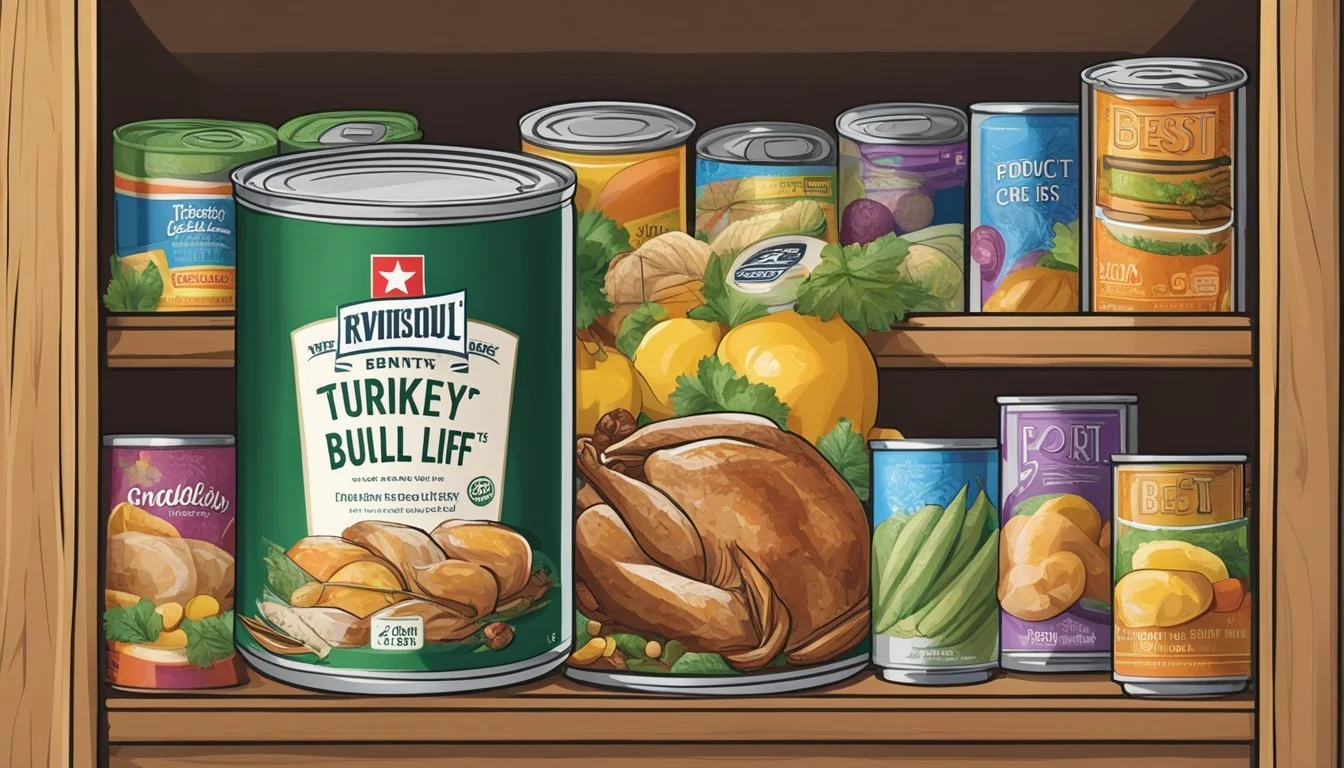How Long Does Canned Turkey Last?
Shelf Life and Storage Tips
Canned turkey (What wine goes well with turkey?), like other canned foods, offers a convenient and long-lasting alternative to fresh or frozen turkey. The shelf life of commercially canned turkey is quite extensive, remaining safe to consume for years if stored properly in a cool, dry place and the integrity of the can remains uncompromised. Despite the durability of canned goods, the peak quality of canned turkey is best enjoyed within the first year or two of canning.
As time progresses, gradual changes in flavor, texture, and nutritional value may occur, although these do not necessarily indicate spoilage. Consumers are advised to monitor home-canned turkey more closely, as its shelf life can be shorter due to variable home canning processes. The National Center for Home Food Preservation provides guidance on proper storage and consumption timelines for home-canned products, including turkey, to ensure safety and quality.
Quality maintenance is key to extending the shelf life of canned turkey. It is essential to avoid exposure to extreme temperatures and to inspect cans for signs of rust, dents, or swelling, which can indicate potential contamination. While canned turkey remains non-perishable and safe beyond its 'best before' date, consuming it within recommended time frames ensures optimal taste and texture.
Canned Turkey Basics
In navigating the realm of shelf-stable foods, understanding the specifics of canned turkey is crucial for both quality and safety.
Understanding Canned Food
Canned food is a method of food preservation that extends the shelf life of perishable items, including meats like turkey. The canning process involves placing the food in containers and heating them to a temperature that destroys potentially harmful microorganisms. Once sealed, canned foods are considered shelf-stable because the airtight environment prevents the entry of pathogens.
Key components of canned food quality and safety:
Sealed: Integral to keeping the contents safe and free from contamination.
Heat Processing: Destroys harmful bacteria and enzymes.
Shelf-Stable: Properly canned and sealed foods are stable at room temperature.
Canned Turkey Specifics
Home canning turkey, a popular type of poultry, requires diligent attention to the canning process to maintain both safety and quality. Meat is a low-acid food and must be processed using a pressure canner to ensure safety from foodborne pathogens like botulism. Properly canned and sealed turkey is safe to consume for a recommended time frame before the quality begins to degrade:
Storage Timeline:
< 1 year: Optimal quality observed.
1-5 years: Safety maintained, quality may lessen over time.
It is imperative that home canners follow guidelines strictly to ensure the canned turkey is both safe and delicious for future consumption.
Safety and Quality Indicators
When it comes to the safe consumption of canned turkey, it is crucial to pay attention to several safety and quality indicators ranging from spoilage signs to the integrity of the can's seal and understanding the meaning behind expiration dates.
Identifying Spoilage
Spoiled canned turkey may exhibit several telltale signs that should be heeded. These include unpleasant odors or tastes, which indicate the growth of spoilage bacteria. Visual cues such as the presence of mold or discoloration also signal that the product is no longer safe to eat. Consumers should trust their senses; if something smells, looks, or tastes off, it should not be consumed.
Seal Integrity
The integrity of the can's seal is paramount for ensuring the safety of canned goods. A secure seal prevents the entry of bacteria and air that can cause spoilage and foodborne illness. Warning signs of compromised seal integrity include rust, leaking, or bulging. If a can shows any of these signs, particularly bulging which could indicate bacterial contamination such as Clostridium botulinum, the product should be discarded.
Expiration and Use-By Dates
While canned turkey can last a considerable time, generally 2 to 5 years for low-acid foods as indicated by the USDA, recognition of expiration and use-by dates is crucial. These dates are provided by manufacturers and are based on quality rather than safety; however, they should still be respected. After these dates, the quality of the product, including its taste and nutritional value, may decline even if the product remains safe to consume. Always read the label carefully and, when in doubt, prioritize these dates to ensure quality.
Proper Storage Practices
Proper storage of canned turkey is essential to maintaining its quality and safety. The shelf life can be significantly extended through appropriate storage conditions and solutions.
Optimal Storage Conditions
For canned turkey, it is crucial to store the product in a cool, dry pantry at a stable temperature ideally between 50°F and 70°F (10°C and 21°C). Exposure to light and heat can degrade the quality of the meat, so a dark and cool environment is preferred. White meat (What wine goes well with white meat?) and dark meat both require the same storage conditions within the pantry. It is also essential to check the integrity of the can before storage, ensuring there are no dents, rust, or signs of damage.
Pantry Storage: Keep cans away from any heat sources such as stoves or heating vents.
Checking Dates: Always note the date of canning; while canned turkey can be safe indefinitely, quality is best within the first year.
Extended Storage Solutions
Once opened, canned turkey should be transferred to another container if it is not consumed immediately. To preserve quality, store the turkey in a refrigerator at or below 40°F (4°C), using it within 3-4 days. For longer storage, freezing is an option.
Refrigerator: Place the turkey in airtight containers or wrap tightly with heavy-duty aluminum foil or plastic wrap.
Freezing: For extended storage, freezing the turkey in appropriate containers or vacuum-sealed bags can keep it safe for consumption for several months, though taste and texture quality may diminish over time.
Avoid Cross-Contamination: Store turkey on a shelf without raw foods to prevent cross-contamination.
Each step must be handled with care to ensure that the integrity of the canned turkey remains uncompromised from pantry to plate.
Maximizing Shelf Life
Ensuring the longevity and safety of canned turkey involves optimal storage conditions and proper canning techniques. These factors are critical in preventing spoilage and maintaining quality.
Impact of Storage Environment
The storage environment plays a pivotal role in determining the shelf life of canned turkey. To maintain quality and safety, the following conditions should be adhered to:
Temperature: Store canned goods at a steady temperature between 50°F to 70°F (10°C to 21°C), as fluctuations can compromise the seal and quality of the food.
Direct Sunlight: Avoid exposure to direct sunlight, which can cause temperatures to rise and affect the contents.
Humidity: Keep in a low-humidity environment, as excessive moisture can lead to rust on the can, potentially compromising its integrity.
Canning Techniques and Shelf Life
The method used for canning turkey has a direct impact on its shelf life:
Home Canning: Utilizing a pressure canner is recommended for canning turkey, as it's a low-acid food requiring higher temperatures to prevent bacterial growth.
Pressure Canning: This process involves reaching temperatures of at least 240°F (116°C) to eliminate the risk of botulism, with shelf life ranging from 2 to 5 years for best quality.
Water Bath Canner: Not suitable for turkey as it doesn't reach high enough temperatures to ensure food safety for low-acid foods.
Remember, always inspect canned goods before consuming. Signs of spoilage include rust, leaking, bulging, or a foul odor, and such products should be discarded immediately.
Understanding Food Preservation
Effective food preservation ensures safety and quality in consumed foods. This section discusses the principles behind canning turkey and the practices to ensure the longevity and safety of canned goods.
Canning Safety Guidelines
When preserving food, safety is paramount to prevent foodborne illness. The United States Department of Agriculture (USDA) provides rigorous guidelines that should be strictly followed. Key components of safety include:
Inspecting jars for any cracks, defects, or improper seals.
Carefully monitoring processing times to ensure safe preservation.
Avoiding the growth of bacteria such as Clostridium botulinum, which causes botulism toxin. This is especially crucial in low-acid foods like turkey.
Using a pressure canner is essential for meats, as it achieves the high temperatures needed to kill harmful bacteria.
Acidity in Canning
The acidity level in canned foods is a critical factor that determines the method of processing. Foods are categorized into:
High acid foods: Including fruits and tomatoes, with a pH 4.6 or lower.
Low acid foods: Such as vegetables and meats, with a pH higher than 4.6.
High acid foods can be processed using a boiling water canner, while low acid foods must use a pressure canner to reach appropriate temperatures to prevent botulism.
Effects of Processing
The processing time and method affect the shelf life and quality of canned foods. Proper canning involves:
Adjusting headspace in jars to allow for food expansion.
Using the correct processing time to ensure the destruction of harmful microbes.
Storing in cool, dry places to maintain quality and extend shelf life, as recommended by the National Center for Home Food Preservation.
The Environmental Protection Agency (EPA) also stresses the importance of processing to minimize environmental contaminants in canned foods.
Health and Nutritional Considerations
When considering the health and nutritional aspects of canned turkey, consumers should be informed about the retention of nutritional value over time and the potential risks associated with contaminated cans.
Nutritional Value Retention
Canned turkey maintains its protein content, a vital nutrient for bodily functions, over its shelf life. The canning process preserves the meat, allowing it to retain much of its proteins, vitamins, and overall nutritional value. It's essential for consumers to note that while canned meat like turkey retains most of its nutritional value, some vitamins may slowly degrade over time, even if the can remains sealed.
Risks of Contaminated Cans
Safety is paramount when consuming canned goods to prevent health risks. Consumers should avoid canned turkey if the can shows signs of damage, such as bulging, leaking, or rusting, which can indicate bacterial contamination including harmful organisms capable of producing gas and toxins. They should ensure cans are stored properly in a cool, dry area to minimize the risk of consuming contaminated canned meat that could lead to foodborne illness.
Culinary Applications
Canned turkey offers a convenient alternative to fresh turkey, providing ease of use in various recipes. The meat retains a good deal of its nutritional value and can be a time-saver for cooks at any skill level.
Incorporating Canned Turkey in Recipes
Canned turkey can be used effectively in a range of recipes. It's particularly useful in dishes where the turkey is not the sole star, allowing the meat to blend seamlessly with other flavors. One can add canned turkey to stews and soups where it not only thickens the broth but also contributes to the overall protein content. In pasta dishes, it can be mixed with sauces, offering a heartier meal option.
Alteration of Flavor and Texture
When using canned turkey, one should note that the flavor and texture may differ from fresh turkey. The canning process can change the color slightly, typically making it paler. The taste might be milder, and the texture softer compared to cooking fresh turkey. These changes can be compensated by proper seasoning. Herbs like sage complement the taste of turkey and can restore some of the flavors lost during canning.
Leftover Usage Ideas
After opening, any unused canned turkey should be refrigerated promptly. The leftovers can be incorporated into new meals within a few days to ensure freshness. It's suitable for making quick salads, sandwiches, or as a protein boost in fried rice. Canned turkey leftovers offer a versatile meat option that can easily adapt to various culinary needs.
Home Canning Insights
Home canning of turkey allows individuals to preserve the quality and safety of their meat, ensuring that home canned foods are both delicious and safe for future consumption. It requires meticulous attention to detail, from preparation to processing.
DIY Canning of Turkey
One embarking on the journey of home canning should understand that canning turkey involves several steps aiming to maintain the quality and safety of the canned foods. Initially, turkey meat must be prepared, which can include cooking, deboning, and separating the meat. For the canning process, one can choose between hot pack—where meat is preheated before canning—and raw pack methods. Hot pack is often preferred as it allows for a better quality of product and longer shelf life.
Canning lids play a vital role in ensuring an airtight seal. One must carefully inspect them for defects and ensure proper sterilization. The use of quality jars that are free from nicks and cracks is also critical. Following proper jar preparation procedures can greatly enhance the shelf life and safety of home canned goods.
Effective Use of Canning Equipment
The pressure canner is the equipment of choice for canning meats like turkey because it is able to achieve the high temperatures needed to safely preserve food by eliminating botulism toxins, which cannot be assured by a water bath canner. A pressure canner should be used as per the manufacturer's guidelines, including regular inspection of the vent, gasket, and pressure gauge.
Safety: Always employ a pressure canner for meats to prevent foodborne illnesses.
Capacity: Know the pressure canner's capacity to accommodate either pint or quart size jars.
Consistency: Ensure even heating and pressure during the process to maintain food quality.
Home canned foods like turkey should be consumed within a year for optimal quality, although they can remain safe beyond this period if the canning process is safely executed and the jars remain sealed. Signs of spoilage should be diligently checked for before consumption.







